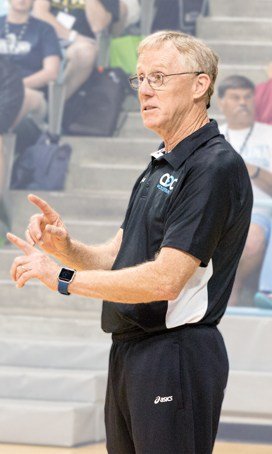
I chuckle when someone unknown to the collegiate coaching world asks what we do during the off-season. “Do you even work?”, “Do you have another job?” or “Do you teach too?”
Coaching volleyball collegiately is a luxury. I am fortunate to be able to do what I love every day. I understand we are a non-revenue generating sport and I am grateful to Title IX for the opportunity it provides.
“Do I even work?” Yes. I work a lot. I spent 10 years in international marketing before pursuing my passion in volleyball. I work more hours now than I did in the business world. Partly because I love what I do, partly because of the demands of the job.
In season (August through December), NCAA Division I rules allow coaches to work with players 20 hours a week. This includes practices, weights, video sessions, meeting times, etc. Although the players put in 20 hours a week with the coaches, it is estimated the players actually spend about 40 hours a week solely on volleyball (USA Today article, College Athletes are Full Time Workers). In addition, the NCAA only requires one day-off a week making it a ‘6 day work week’ for the student athletes, and this does not factor in travel time. Fortunately for me, Miami University and my former institution, Winthrop University, play matches on Friday and Saturday which means we are home every Saturday night (well, more like the wee hours of Sunday morning), but at least we are home for most of Sunday. Other conferences play on Sunday (because of football) and the players’ mandatory one day-off a week is actually on Saturday, while they are on the road (they just don’t practice that day). They will return home Sunday night (more like the wee hours of Monday morning) for class the next day.
Yes, these are “Student-Athletes”. Figure they carry 12 – 18 hours of class per week plus homework, and they easily have a 70 – 80 hour week. Time management is of the essence and keep in mind, many of these freshman are acclimating to living on their own for the first time. A new bed, laundry, chores, new food, eating habits, etc. Almost every freshman calls home crying at least one time in the fall wondering what the heck did she get herself into?!?!
 Even Nebraska Volleyball All-American, Hannah Werth struggled, “I was just a pup and I was playing with girls who were 22 years old,” Werth said. “Just trying to find my niche and understand who I am, as well as find my place within a bigger whole. You're really forced to, not necessarily grow up fast, but develop into who you are at a faster pace because everything goes by so quickly.” Werth admitted second-guessing nearly everything. Was she happy with the path she had chosen, the school she attended?” (Big Red Today, November 26, 2012).
Even Nebraska Volleyball All-American, Hannah Werth struggled, “I was just a pup and I was playing with girls who were 22 years old,” Werth said. “Just trying to find my niche and understand who I am, as well as find my place within a bigger whole. You're really forced to, not necessarily grow up fast, but develop into who you are at a faster pace because everything goes by so quickly.” Werth admitted second-guessing nearly everything. Was she happy with the path she had chosen, the school she attended?” (Big Red Today, November 26, 2012).
The coaches work incredible hours too. The hours and demands can be overwhelming, so last season I put together a spreadsheet of my own to keep me on task (coaches need time management too).

Realize, I’m just a lowly assistant coach; head coaches have more demands (academics, recruits, donors, boosters, alumni, media, etc.). This chart also did not take into account recruiting. During season, we’ll head off to a high school to catch a match and recruits are often visiting campus. That’s additional nights and dinners away from home. And my mother wonders why I don’t date? 🙂
If you have been following along with my posts on the Art of Coaching Volleyball (click here to see those posts), you will certainly understand that we work during the “off-season” too. NCAA Division I rules allow us to work with the players about half the time during the spring and we have four competition days (typically travel to Saturday tournaments of 2 to 4 teams).
The “extra” time in the spring we get away from practice and video is replaced with recruiting travel. I’m sure my “off-season” hours chart would be 60 – 70 hour weeks. Between spring tournaments and 14 recruiting trips logged this spring, my first full weekend “off” was the first weekend of Quiet Period. (Although it was Miami’s Graduation weekend, so we spent Friday night with senior players and parents and Saturday afternoon with graduation festivities).
Quiet Period is a NCAA rule (Division I coaches only) which consists of about 20 days where coaches are not allowed to go off campus (to a tournament or club facility) to contact or evaluate a player. This is a blessing for Division I college coaches (I’ve heard much jealousy from D-II coaches!) because it allows us to be home for a few weeks and cut our grass (or take a vacation). The irony is that when you do what you love for a living, our vacations are often centered around volleyball. Miami University’s other Assistant Coach, Jenni Hirneisen, has decided to travel to Calgary, Alberta Canada for The Art of Coaching Volleyball Clinic. Why? Because we spend so much time with the game, we only have volleyball friends 🙂
Coaching is a very demanding and competitive profession for very little pay. You may have seen a recent article of Highest Paid State Employees (click here for the graph/article). Basketball or football coaches are amongst the very top in many states. They obviously have greater revenue demands, but we work the same hours. My first assistant coaching job paid me $19,000 per year, followed by a Volunteer position in my second year. We don’t do this for the money.
Unfortunately, I’ve seen too many great coaches leave coaching for other professions. A good coaching friend of mine just left college coaching after 5 years to work at a hotel for twice the pay, half the hours, no travel, and much less responsibility. It’s tempting. I also have too many coaching friends that left the profession to start a family. Many assistant coach’s salaries will not even cover daycare expenses. The spouse is the bread-winner and the coach’s pay isn’t enough to keep these coaches in the business. It’s a shame. I’m not complaining, just the reality of the coaching business. There are sacrifices to be made for a “luxury” job.
Many, too many, sacrifices are also made by high school and club volleyball players across the country. How many kids (and parents) are playing volleyball for that elusive college scholarship? I researched the numbers on college scholarships to learn that only 3% of all high school seniors will earn a volleyball scholarship (not a full scholarship), in any Division (CoachRey.com - Women’s College Volleyball Recruiting Facts). I also posted a great article on the illusion of scholarships Coach Rey - Athletic Scholarships the Illusion of Opportunity. The point being is that I have seen too many volleyball players playing all year round and often missing lifetime memorable events, such as Prom or family vacations.
So what does all this have to do with the Quiet Period? In my humble opinion, I believe a large reason club volleyball players enter tournaments to be seen by a college coach to be recruited. The current Quiet Period does not extend long enough (as it ends May 24th this year) and Division I college coaches will be back on the road recruiting at AAUs and USA Volleyball Nationals in June and July (among a few other smaller spotty tournaments).
If we (the NCAA – with the coaches’ push) extend the Quiet Period through July, it is my belief that a lot less teams would enter tournaments in May, June, and July. I believe the National Tournaments would move to the end of April (I have heard rumors of USA Volleyball considering National Tournaments for young age groups to this time of year).
This would give a volleyball reprieve to the kids playing year round (obviously save a great deal of money for parents – probably enough to save for college ;). We would see less overuse injuries of kids coming in to college. These kids might actually miss the game and love playing volleyball again. It would allow college coaches to have a break and somewhat of a real life, (even allow those coaches that earn less than minimum wage to pick-up a summer job), and ultimately have happier volleyball players and coaches across the country. But who am I? Shhh! 🙂


